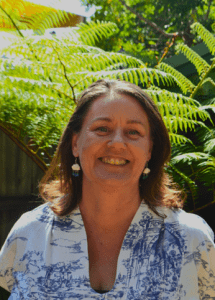01 Nov Working at the Hotline

Sally George, former Hotline Teacher
In June this year one of our wonderful teachers, Sally George left the Hotline for a permanent teaching position at St George TAFE in Sydney. We caught up with Sally recently and asked her about working at the Hotline, the changes she saw and some of her best moments.
How did you first get involved with the Hotline?
I started in 2016. I responded to an expression of interest that the Hotline had sent out. I knew about the Hotline as I had been working at a college and we had received some Hotline referrals.
What skills do you need to work on the Hotline?
I think you need:
- a good knowledge of adult learners and an understanding of literacy/numeracy learners
- skills in talking and making notes at the same time
- a knowledge of national providers
- having a bank of top-notch open-ended probing questions
- good listening skills and compassion
- to be able to quickly build rapport and never ever talk down to people.
What has been the best thing about working on the Hotline?
Every call is different which is exciting. Every person I spoke to rang with intention and reason. The Hotline answers their call. I feel that in the years I worked there I honoured that.
Speaking to a person who may be voicing perhaps for the first time their concerns is a real privilege. For example, why they hated reading aloud as a child, what they worry they are demonstrating to their own small children or how frustrated they are with people not understanding their difficulties with literacy.
What is the hardest thing about working on the Hotline?
Not being able to find suitable or available learning options for a caller either because of where they live or their specific needs.
Working on the hotline during COVID lockdowns was a unique and disquieting experience. During that time many people rang the hotline. The talking was long, in-depth and sometimes exhausting.
Based on your experience of talking to callers where is the greatest need in Australia?
Geographically that’s the Northern Territory or Northern Queensland and other isolated and remote areas of Australia. In terms of learners, we need more provision for
- people who are beginners, who need one on one support to build up to attending a class
- school refusers aged over 16and transitioning school leavers
- people already with qualifications and in jobs but who need to take their numeracy and literacy skills to a higher level to meet new job skill requirements
- people in the workplace around industry specific language or who need culturally subtle tone and meaning that ‘fits’ the workplace ‘culture’.
What changes have you seen in the literacy, numeracy and digital literacy sector over the years from working at the Hotline?
A major change has been the increased interest and need in the community for digital skills to access basic services and community participation.
There has also been a change around literacy qualifications. There is a misunderstanding that the Certificate IV in Training and Assessment is an adequate qualification to deliver effective and meaningful adult literacy learning.
Another change has been the dissolving and/or de funding of local community and or disability centres that had small literacy classes or life skills programs run by locals. They have been replaced by vague and far away in city services that are not close or relevant and hard to contact because they are online or have a phone that isn’t answered.
How do you think the Hotline has changed since you first started?
I think thanks primarily to Vanessa Iles our platform, impact and seat at the national table for LLND discussions has increased enormously.
Who is the caller who most made an impression on you? Whose story has stuck with you over the years?
During COVID lock down and working on the hotline from home I remember a caller who was living in Victoria with her two children. She was working from home and had suddenly realised how much she needed her workmates to help her to write things. She hadn’t realised how important her colleagues were until she wasn’t seeing them every day. She was noticing her literacy and problems that she struggled with as a child and young person. She saw her kids experiencing the same anxieties and the confidence crushing worries about not writing well and ‘feeling dumb.’
As an adult she was now able to acknowledge that there was a skill she had missed – something was not the same as other people. She couldn’t put her finger on it and she wanted to fix it. She missed her workmates and their support especially how they didn’t make her ever feel she was making mistakes or couldn’t spell. Now stuck at home with just her computer, she felt that school feeling again. Because I was also ‘stuck’ at home in a house with a teenager I felt a connection and a kinship that makes me worry about her, even still. I also think of the kind, unthanked colleagues who were helping her.
What’s the best feedback you ever got from a caller?
People thanking me for explaining clearly, listening, understanding or remembering them when they call back.




